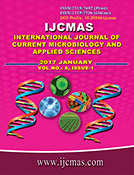


 National Academy of Agricultural Sciences (NAAS)
National Academy of Agricultural Sciences (NAAS)

|
PRINT ISSN : 2319-7692
Online ISSN : 2319-7706 Issues : 12 per year Publisher : Excellent Publishers Email : editorijcmas@gmail.com / submit@ijcmas.com Editor-in-chief: Dr.M.Prakash Index Copernicus ICV 2018: 95.39 NAAS RATING 2020: 5.38 |
Horse gram (Macrotyloma uniflorum), belongs to the family Fabaceae is one of the minor or lesser known neglected legume mainly cultivated due to high levels of protein. It is considered as poor man’s pulse. Horse gram has an excellent nutritional, therapeutic and medicinal properties. Field variety of horse gram seeds were collected from the Indurthi village, Kharimnagar district, Telangana, India. The legume seed borne fungi was screened by employing blotter paper method, agar plate method and dilution plate method. The untreated seeds were found to be associated with the highest number of seed borne fungi.64 species and 32 genera were isolated. Among them Alternaria spp, Aspergilllus spp, Cheatomium spp, Cladosporium spp, Curvularia spp, Drechslera spp, Fusarium spp, Mucor spp, Pencillium spp, Rhizopus spp, Trichodrma spp were dominant species isolated from the three methods. In all the three methods blotter method had recorded most of the fungal species than the other two methods.
 |
 |
 |
 |
 |